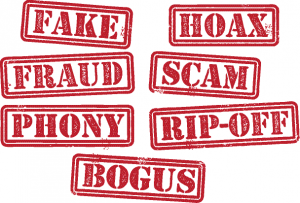New Spammer on the Net?
 It appears there’s a new spammer working the email servers these days. In the last week, our spam folder size has tripled from its normal levels. In addition to the usual junk email, we’re also seeing an uptick in phishing attacks – loosely, that’s where an email purports to come from a known entity, but in reality is fake. Here’s a random short list of the dirtiest dozen of these new spam emails we’ve seen:
It appears there’s a new spammer working the email servers these days. In the last week, our spam folder size has tripled from its normal levels. In addition to the usual junk email, we’re also seeing an uptick in phishing attacks – loosely, that’s where an email purports to come from a known entity, but in reality is fake. Here’s a random short list of the dirtiest dozen of these new spam emails we’ve seen:
- FBI warnings that you’ve been identified on scammer lists and need to send money to them to claim the money that’s rightfully yours
- Nominations for professional or personal recognition
- Amazon.com account locked warnings
- Fake auto-policy term updates
- Bogus offers for various savings or price reductions, including insurance, consumer goods and advertising
- Tempting missives about your popularity on social networking sites like Facebook or Twitter, and offers to increase your friends/followers for a low price
- Crazy-low prices on various consumer goods including iPads and computers
- Emails that look like they come from your bank or other financial institution, asking you to verify your account details
- Emails that look like they come from a financial institution you don’t know, asking you to claim an abandoned account
- Health scare warnings, and fake tips for improving your health
- Fake bills for services or products you never ordered or received (there are also physical ‘bills’ you receive by postal service that look like bills, but aren’t)
- Fake job offers, IP voicemail notifications, and requests for you to call someone
Please share this information with anyone you think might be at risk of succumbing to any of this quackery. That includes anyone who takes even a moment to wonder if any of them are real. Flat-out, they aren’t. Pretty much anything sent out via email is untrustworthy, and we are skeptical about most other outlets for information as well.
Below the Fold
It’s easier than you think to be fooled by these. Our society has long taught us to believe what we see in writing, no matter how unreasonable it sounds. As children in school, we read textbooks, and our teachers treat textbook content as facts to be absorbed – tests and grades reinforce that aspect. Even when we read about how inaccurate many textbooks are, we can’t overcome the foundation we were taught from our early years to trust the written word.
Scammers and spammers and other nefarious crooks capitalize on this aspect of human nature. They are constantly refining their pitches and adjusting them to counteract every improvement in anti-spam and anti-scam technology and education. And fake information or knowledge is all around us, in news reporting, gossip, and even the newly-popular infographics. The truth is that information and knowledge is people-generated, and we humans cannot be truly objective – no matter what we claim. Every human alive or dead has or will always color what we say with what we believe. Even so-called objective surveys have their questions written in such a way as to yield the results the survey-writers want – whether consciously or unconsciously. Some of the best journalists, scientists, elected representatives and even heads of state are caught by this universal inability to be truly objective – mightily though we all try.
Our best hope is skepticism – we need to develop a healthy skeptic’s viewpoint on just about everything we’re exposed to. And this isn’t easy, many people have decades of experience trusting in the written word on top of their early childhood development. But we all need to work hard at this.
Think of this as learning a new skill – and consider that learning a new skill isn’t nearly as daunting as we’ve been taught. It doesn’t take 10 thousand hours to learn a new skill, it really only takes about 20 hours. Sure, that only gets you 80% of the way there, but only Olympic contenders and full-blown experts will invest the additional 9,980 hours to get to over 90% and become recognized experts. And another truth is that 80% mastery of a skill is really good enough for just about everyone. Skeptics (hey, that should be you!), please watch this awesome 20-minute TEDx talk by Josh Kaufman:
This website runs on a patronage model. If you find my answers of value, please consider supporting me by sending any dollar amount via:
or by mailing a check/cash to PosiTek.net LLC 1934 Old Gallows Road, Suite 350, Tysons Corner VA 22182. I am not a non-profit, but your support helps me to continue delivering advice and consumer technology support to the public. Thanks!








